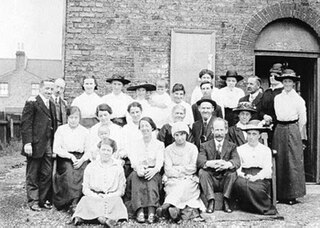
The Plymouth Brethren or Assemblies of Brethren are a low church and Nonconformist Christian movement whose history can be traced back to Dublin, Ireland, in the mid to late 1820s, where it originated from Anglicanism. The group emphasizes sola scriptura, the belief that the Bible is the only authority for church doctrine and practice. Plymouth Brethren generally see themselves as a network of like-minded free churches, not as a Christian denomination.

Pathanamthitta District, is one of the 14 districts in the Indian state of Kerala. The district headquarters is in the town of Pathanamthitta. There are four municipalities in Pathanamthitta: Adoor, Pandalam, Pathanamthitta and Thiruvalla.

Thiruvalla, also spelled Tiruvalla, is a municipality in Pathanamthitta district, Kerala, India. It is also the headquarters of the Thiruvalla taluk. The town is spread over an area of 27.15 km2 (10.48 sq mi) and has a population of 52,883, down from 56,837 in 2001. It lies on the northern banks of the Manimala River, in a land-locked region surrounded by irrigating canals and rivers. It is the largest town in the district, and is one of the financial, educational, healthcare, cultural, and commercial centres of central Travancore.
Pentecostalism has grown in India since its introduction in the early twentieth century. Several Pentecostal missionaries who had participated in the Azusa Street Revival visited Kerala from 1909 onwards. During the 1920s the missionary Robert F. Cook established the Indian branch of the Church of God, based in Kerala. In 1922 Assemblies of GOD church was established in Melpuram which was part of then Travancore state by missionaries. It has been one of the early pioneering churches in the region. Two other churches founded around this time were Ceylon Pentecostal Mission (CPM) later became The Pentecostal Mission, in the 1980s, founded in Sri Lanka by the Indian evangelist Pastor Paul, and later brought to India; and the Indian Pentecostal Church of God, set up by K.E. Abraham after he split from the church founded by Cook. A later foundation, in 1953, was the Sharon Fellowship, which runs the Sharon Women's Bible College.

Kumbanad is a town located in the Koipuram Town Panchayath Along with Pullad. It is part of Thiruvalla Taluk of Pathanamthitta district in the State of Kerala. It is an important town situated on T.K. Road, equidistant from Eraviperoor and Pullad; which are at a distance of 3 km.

The Kerala Brethren are a subset of the Open Brethren movement. In the South Indian State of Kerala, four Syrian Christian (Nasrani) men who came from traditional churches were baptised in 1898.

Paddinjattedathu Chacko John (1875–1943) was an evangelist and Bible teacher from the Indian State of Kerala. Raised among the Saint Thomas Christians, he joined the Plymouth Brethren as an adult, and is regarded today as one of the pioneers of the Kerala Brethren.
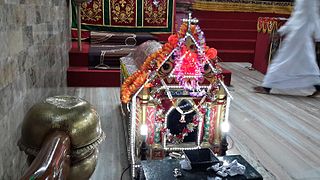
Mar Thoma IX was the ninth Metropolitan of the Malankara Church in Kerala, India for a brief period in 1816. That year, he was consecrated Metropolitan by Mar Thoma VIII, but soon after his ordination he was dethroned by Pulikkottil Joseph who was appointed by the then British resident Colonel John Munroe.
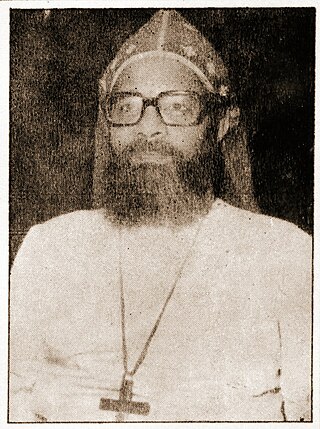
Easow Mar Timotheos was an Indian episcopa (bishop) of the Malankara Mar Thoma Syrian Church, an Indian Christian church tracing its history back to Thomas the Apostle in the 1st century. He was a bishop from 1975 to 1988, and a missionary priest before that.
Protestants in India are a minority and a sub-section of Christians in India and also to a certain extent the Christians in Pakistan before the Partition of India, that adhere to some or all of the doctrines of Protestantism. Protestants in India are a small minority in a predominantly Hindu majority country, but form majorities in the north-eastern states of Meghalaya, Mizoram and Nagaland. They are also significant minorities in Punjab region, Konkan region, Bengal, Kerala and Tamil Nadu, with various communities in east coast and northern states. Protestants can trace their origins back to the Protestant Revolution of the 16th century. There are an estimated 20 million Protestants and 16 million Pentecostals in India.
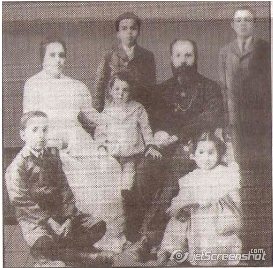
Volbrecht Nagel was a German missionary to the Malabar coast of India. Initially associated with the Evangelical Lutheran Church, he later joined the Open Brethren, and is remembered now as a pioneer of the Kerala Brethren movement.
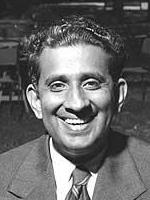
Madathilparampil Mammen Thomas (1916—1996) was an Indian Christian theologian, social thinker, and activist. He served as Governor of the Indian State, Nagaland (1990–1992), and as the Chairperson of the Central Committee of World Council of Churches (1968–1975).
Thiruvalla Taluk is a Taluk of the Pathanamthitta district in the Indian state of Kerala. The headquarters of the Taluk is in Thiruvalla which covers an area of 152 sq. km and has a population of 223,503. Despite having 5.7% geographical area of the district, it holds over 18.6% of the population of the district.
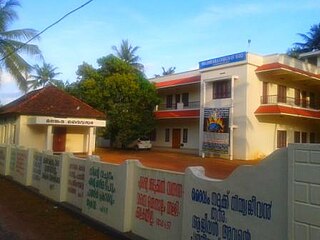
Malankara Church of God Thrikkannamangal is a church in Kottarakkara, Kerala, India, originally known as Malankara Poorna Suvisesha Sabha.
Pentecostalism is a renewal movement within Protestant Christianity that places special emphasis on a direct personal relationship with God and experience of God through the baptism with the Holy Spirit. For Christians, this event commemorates the descent of the Holy Spirit upon the followers of Jesus Christ, as described in the second chapter of the Book of Acts. Pentecostalism was established in Kerala, India at the start of the 20th century.

The Assemblies Jehovah Shammah are an Evangelical Christian network of churches that originated in India, which is still home to the great majority of them. The Evangelical publication Operation World estimates their numbers, as of 2010, at 310,000 adults and children in 910 assemblies, as their churches are generally known. Other sources estimate upwards of two thousand congregations, with a large presence in the State of Andhra Pradesh. The movement was founded in 1942 by evangelist Bakht Singh, whose theology and ecclesiology were much influenced by the Open Brethren. Although historically distinct from the Indian Brethren movement, which originated from missionary endeavours, the Assemblies Jehovah Shammah have a lot in common with it and are sometimes considered a part of the Brethren movement worldwide.
The Open Brethren, sometimes called Christian Brethren, are a group of Evangelical Christian churches that arose in the late 1820s as part of the Assembly Movement within the Plymouth Brethren tradition. They originated in Ireland before spreading throughout the British Isles, and today they have an estimated 26,000 assemblies worldwide.
Joseph Gelson Gregson (1835–1909) was an English Baptist missionary to the Indian sub-continent during the British Raj.











